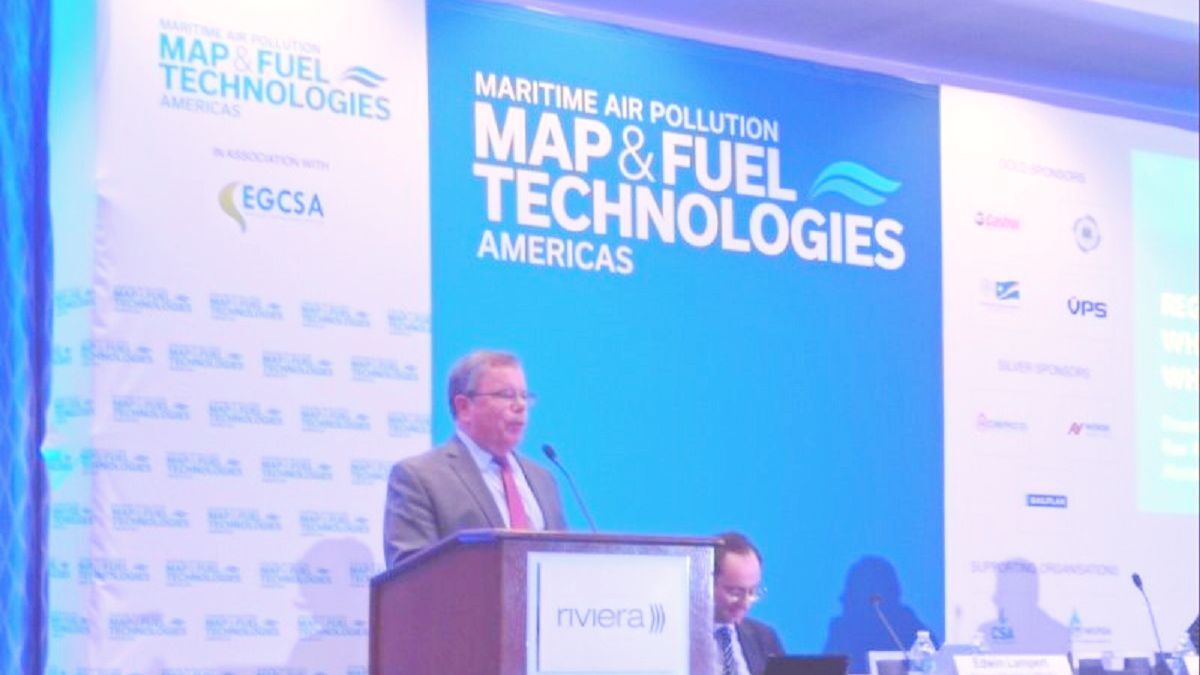One of the opening sessions of the Maritime Air Pollution & Fuel Technologies Conference, Americas 2022, held in Houston April 2022, concerned how current and future regulations will impact the maritime sector
The regulatory session at the Marine Air Pollution, Americas conference included a keynote address from Rear Admiral Kevin S Cook, USCG (retired), who is now a maritime consultant with /The Marshall Islands Registry, followed by a discussion by DNV business development director Jan Hagen Andersen and ABS Houston Sustainability Center manager Stergios Stamopoulos.
In his opening remarks, Rear Admiral Cook noted the Marshall Islands was in an interesting position. “Marshall Islands is very active in IMO and has been a leader in helping drive the work that’s ongoing for reducing greenhouse gases,” he said, “Yet we (Marshall Islands) have this enormous fleet of ships.”
The Marshall Islands is one of the island nations in the front line of climate change, and this, plus the growth in the fleet, give the island state a voice of value in the marine air pollution debate.
This is not a conflict, “The service that Marshall Islands provides to owners helps to keep them in compliance and keep them from being detained or delayed, which has added to the growth in the fleet,” said Rear Admiral Cook.
As regards to regulation, he noted Marpol Annex VI, which governs air pollution, is only six years old, whereas Marpol Annex I, which covers oil pollution, is 40 years old. In this comparison, the progress in air pollution regulation in such a short space of time is remarkable, said Rear Admiral Cook.
But there are anomalies in IMO’s strategy, noted Rear Admiral Cook, and this is becoming more evident after COP 26 and other climate change strategies outside of maritime. One issue is IMO’s development of its greenhouse gas (GHG) strategy and the roadmap was political – many of the people involved in MEPC were also involved at other levels and, unusually for IMO, the approach was not as technical as it had been in the past.
This is one of the reasons there are already amendments and alterations tabled for some of the EEDI, EEXI and CII processes.
While this is very difficult for shipowners with the 20 to 30-year life expectancy of ships, Rear Admiral Cook noted “…the tolerance for any type of leniency regarding greenhouse gas emissions is very low (at UN and other organisations).”
The growing issue is the different blocs that are developing: EU’s own approach, USA’s approach and how these will play out within IMO, concluded Rear Admiral Cook.
Adding to the debate was Mr Andersen, who has been looking at this issue for a decade. He noted the outlook for maritime services is increasing and while shipping decarbonisation plans will have an impact, will this be enough to counter the growth?
Another factor is that other industrial sectors are decarbonising at a faster rate than shipping is at the moment and will continue to decarbonise faster based on the plans shipping has in place. “We can expect the maritime share or the worldwide CO2 and GHG emissions could continue to increase from the 2% to 3%, we see today, (to a larger percentage) as other sectors decarbonise,” said Mr Andersen.
Mr Stamopoulos introduced into the debate the issue of where shipping’s reduction in GHG is going to be measured. As Rear Admiral Cook alluded, the development of IMO strategy and the roadmap had political elements. One of these was to measure GHG reduction from ’tank to wake’. Mr Stamopoulos noted the EU is bringing in the concept of ’well to wake’ which will bring in the need to account for CO2 and GHG emissions from the production of the fuel as well as its combustion and use on the vessel.
But IMO and EU plans and regulations for GHG emissions reductions will, in the future, be overtaken by a third force, noted Mr Stamopoulos.
The very large corporations that have intimate control of their supply chains, such as an Amazon or an IKEA, have already stated goals for net zero and or zero carbon for their supply chains by 2050. These goals go far beyond those of IMO. “There will be direct and indirect pressure to the supply chain,” said Mr Stamopoulos. If a shipping company wishes to serve an organisation with such ambitions, it will have to mirror those goals – simply complying with IMO will not be enough.






